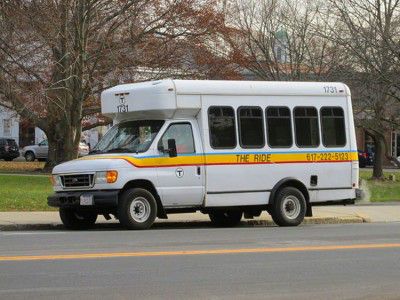
More than a year after the fare for the RIDE, the Massachusetts Bay Transportation Authority’s door-to-door transit service for elderly and disabled people, was raised, MBTA officials announced a potential decrease in price on Tuesday.
The legislation announced at the Massachusetts Department of Transportation’s Audit and Finance Committee meeting would change the fare from $4 to $3. The proposed change comes after opposition to a July 2012 increase that raised it to $4 from several advocacy groups, including the Massachusetts Senior Action Council and Community Labor United.
“We’re committed to continuing to fight for increased affordability in the system,” said Diana Bell, the senior organizer at CLU. “Affordability is critical for equal access to public transit. The reality is that the folks who use this service, especially many seniors and disabled folks, are on a very fixed income.”
The proposal to reduce the fare came out of a collaborative effort between several community organizations and the MBTA with the goal of balancing costs and affordability, Bell said.
Joe Pesaturo, spokesman for the MBTA, said the impact the fare drop would have on the system’s budget and operating costs are not yet known, but he sees several possible benefits to counter the monetary losses.
“[If this fare reduction is approved], more eligible RIDE customers on fixed incomes will be able to take advantage of the door-to-door para-transit service,” he said.
The RIDE functions as an alternative mode of transportation for those who cannot rely on standard public transportation, such as buses or the subway, due to physical or mental disabilities, according to the MBTA RIDE website.
A majority of RIDE users who make less than $2,000 a month were forced to cut down on spending for food and transportation, due to the $4 fare, and approximately 40 percent of RIDE users said they used the transportation system less as a result of the new cost, according to a September study from the Massachusetts Executive Office of Elder Affairs.
In addition to the MBTA and the SAC, Bell said the Boston Center for Independent Living, the Bay State Council of the Blind and the Public Transit Public Good Coalition endorsed the proposal to provide a broader demographic support base.
“The coalition represents … not just seniors and disabled riders, but young people and regular riders, who are dependent on their income and can’t afford higher fares,” she said. “There’s a clear recognition of the need for immediate relief.”
The Massachusetts Department of Transportation Board of Directors will vote on the proposal at their Dec. 11 meeting. If approved, the MBTA hopes to enact the changes by January 2014.
Several residents said they were in favor of the price drop.
“A lot of people just don’t have the money, and every dollar really makes a difference,” said Jehediel De Jesus, 17, of Roxbury. “They really should be paying more [than users of standard transportation] just because they’re getting more special treatment, but it’s not right to raise it higher than they can pay for.”
Devin Damato, 22, of Allston studying at the Berklee College of Music, said he was in favor of making the RIDE easily accessible to those who need it, but was not sure the price drop provided enough benefits to counter what it would cost the MBTA.
“People who have ridden it [the RIDE] that I’ve known always praise the drivers and operators for doing a great job, so making sure it’s available is very important,” he said. “At the same time though, $1 does not mean much. Even after it would add up for one person, the difference is not that much from what it would normally be [with the existing fare]. System-wide though, it’s going to cost the system a lot more. Because of that, I’m not sure it makes sense to lower the price.”
Sarah Bouchard, 29, a social worker from Brighton, said guaranteeing social benefits far outweigh the social cost.
“Anything that increases accessibility for those who need it is a definite plus for people who need transportation,” she said. “The T obviously struggles with money, but … it’s one of those things where if we’re not looking out for the people in our society who need our help the most, we’re not doing our job as a city.”
Steven Dufour contributed to the reporting of this article.






















































































































Mike McCollum • Dec 2, 2013 at 9:21 am
Felicia,
Great job with this story. Mass Senior Action and Community Labor United show what a united coalition can accomplish with dedication, cooperation, and sense of mission. The fare rollback is a significant first step for transit equity for everyone, but this is not a solution. I hope the Daily Free Press continues it’s coverage of transit equity.
Best,
Mike McCollum, Communications Coordinator, Mass Senior Action Council
[email protected]